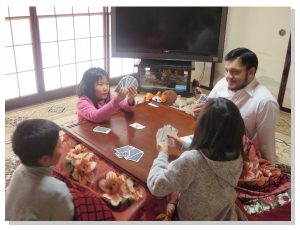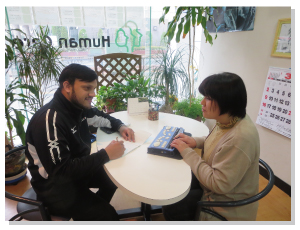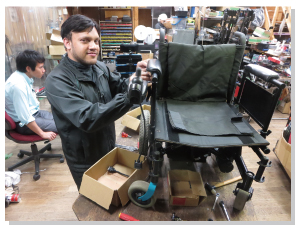- HOME
- Alumni News
- Omer Pervaiz (15th trainee)
- Omer's Final Report
Omer's Final Report
Let’s Change Society Together!
Introduction
I am a lawyer from Pakistan. Pakistan also has law for people with disabilities, but as it is so antiquated, I wanted to study the corresponding Japanese law. I also had a keen interest in Japan’s regulations and policies for people with disabilities. Being able to participate in this training was a dream come true for me.
Studying Japanese
I studied Japanese for three months with my fellow trainees. I felt that Japanese was the most difficult language in the world. As my Japanese improved very slowly, my teacher told me to study harder. After studying hard daily with my teacher, who was very kind, I was finally able to speak Japanese, but still not too well.
My activities in Japan
In Japan I was engaged in a number of activities. I participated in the Gold Concert, and also the Nagoya City Handi Marathon. I visited a number of places and experienced Japanese culture. Japanese food is very tasty. My favorite Japanese food is soba (buckwheat noodles) and Gyudon (beef rice bowl). Of places I visited, I liked the sea and mountains of Naruto most.
Homestay
During the New Year I went to stay at the home of Ken san in Nagano, which was my first ever homestay experience. With Ken san’s family I went to Tatsuno, Hamamatsu, and Matsumoto Castle. I played a lot with Ken san’s children, and talked for hours with Ken san. The other host family was the Morigami family. I stayed at their house on the first and last day of my homestay visit. Both families were very kind. I would like to express my heartfelt gratitude to both families.

Management of my own disability
In Japan, for the first time in my life, I learnt about the true nature of my disability. A CT scan revealed what my real disability was. The doctor talked to me at length about my disability, and taught me how to manage it. I felt that knowing the reality of my disability changed my life.
Individual training
1. Non Profit Organization Center for Independent Living Iruka Okinawa
I spent the first two weeks of my individual training at the Non Profit Organization Center for Independent Living Iruka Okinawa, where I learnt about their activities. I met Mr. Takamine, Mr. Okashima, and Ms. Iwata, who told me about the development of the movement in Okinawa to enact regulations for people with disabilities. They also taught me the details of each regulation. In Okinawa I had my first independent living experience. In the independent living experience room, I cleaned the room and cooked daily. I also talked with Ms. Nagai at length about people with disabilities. The language of Okinawa was very different from the Japanese language I had learnt, but by the time I left Okinawa I was able to understand it. I revisited Okinawa in March to assist with the forum to appeal for the regulations.
2. Japan National Assembly of Disabled People’s International (DPI-Japan, Tokyo)
At DPI I learnt a lot from the leaders of disability movement. We covered a wide range of subjects, including a barrier-free society, Japan’s laws and regulations, and DPI’s activities. I talked a lot with Mr. Onoue, Mr. Sai, Mr. Kamizono, Mr. Tamaru, and Mr. Horiba.
3. Human Care Association (Tokyo)
At the Human Care Association, Mr. Nakanishi told me about the disability movement in Japan, including what was done to change Japan’s law, the current issues, and future plans. I also studied about DPI Asia-Pacific (DPIAP). During the training I also visited the administration office of the Japan Council on Independent Living Centers (JIL).

4. Independent Living Center Movement (Osaka)
I trained for one month at CIL Movement. I arrived late every day, even though I used an electric wheelchair to commute. The staff members at the Movement were all young and fun, so we chatted and visited various places together. Also for the first time in my life I experienced all-night karaoke. I managed to observe a wide variety of activities by people with disabilities in Osaka. I also visited the Mainstream Association and CIL Muchu. On my last day of training I cooked Pakistani food and served everyone.
5. Saito Kobo
I trained for three days at Saito Kobo, a manufacturer of electric and manual wheelchairs. After the guidance about electric wheelchair parts, I tried to repair a wheelchair myself. As I love technology, it was wonderful to be in touch with information about various new wheelchairs. I learned about the Sakura Wheelchair Project in detail and also visited the site where electric wheelchairs were being collected for the project.

6. Various Activities
During the individual training, I met many leaders of disability movements and activities. For example, Mr. Higashi taught me about government policies for people with disabilities. I talked with Mr. Kadota from the Mainstream Association about independent living and ambitions. Other than that, I consulted many times with Mr. Ikehara about the DRTAP Project, and formulated a plan for the project I wanted to implement in Pakistan. I also went to the congressional office building to learn about how law is formulated and about the way politicians think when formulating the law.
Sports
As I love sport, I participated in many sport activities in Japan. During the 10 months, I enjoyed sport with people with and without disabilities. Japan has a wonderful system where people with disabilities can enjoy a variety of sports, but this is not so in Pakistan. While in Japan I enjoyed swimming and skiing more than anything. I did my ski training in Niigata. It was the first time for me to ski and was the most fun sport training I ever had. It was so enjoyable to ski with the staff of JSRPD and Duskin.
During the Japanese training, we also had a weekly swimming class. I had never swum before, and never thought I would be able to, but eventually I succeeded, thanks to the training.
What I will do after returning home
In Japan I spent much time studying Japanese laws, regulations, and policies for people with disabilities. When I am back in Pakistan, I shall share the information I obtained in Japan with people in my organization, and with other organizations for people with disabilities. I would also like to start a movement in Pakistan to formulate a new law for people with disabilities, hand-in-hand with our politicians. I will engage in a variety of projects, with support from Japanese organizations.
Lastly
Having trained in Japan for 10 months, I feel like I have changed from within. Previously I did not know what policies would be best for people with disabilities. Now, having observed Japanese systems, I have gained some ideas and new concepts. I will go back to Pakistan with a sense of responsibility in my heart, to change the society of Pakistan.
I would like to express my heartfelt thanks to everyone at my training destinations, and to everyone at Duskin AINOWA Foundation. Thank you very much.




